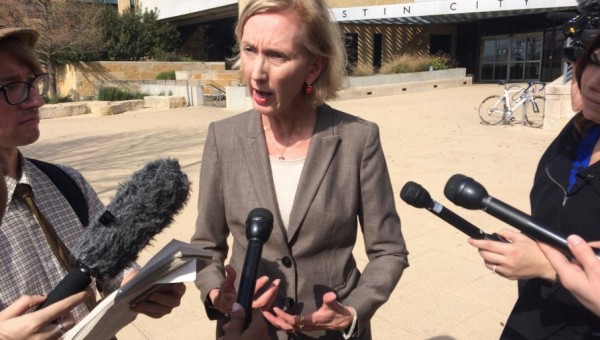
On Friday, the Austin city clerk tossed a petition to recall District 5 Councilwoman Ann Kitchen on a technicality, arguing that each of the document’s 989 pages did not include a notarized affidavit. The petition met two of the three requirements: 10 percent of eligible voters in Kitchen’s district signed the petition (it actually exceeded this requirement), and the document accurately informed voters of its intention.
But instead of acknowledging the citizens’ massive endeavor to oust a council member they feel neglected her duties of public service, the city clerk refused to allow grassroots group Austin4All to correct its mistake, and is holding the petition hostage, according to Justin Arman, Executive Director of Texans for Accountable Government, a trans-partisan PAC that assisted in the recall effort.
“This isn’t a matter of formality, they are effectively slamming the door on 5,000 voters in District 5 – this is what democracy looks like to autocrats,” said Arman.
The clerk’s rejection of the petition appears to be unprecedented. It’s unclear whether the city has previously thrown out petitions based on a similar technicality, or if they worked with groups in the past to reach a solution; if the latter is true, the city has a responsibility to help Austin4All reach the requirements.
‘Just because it’s a rule, doesn’t make it right’
“People are saying that rules are rules; however, I find that if the city wanted to be reasonable, they could simply return the petition and let them cure this problem by calling back all the petition gatherers and getting their signatures notarized properly,” said Arman.
Also obscure, is what recourse, if any, Austinites have. The Austin Statesman reported that they would have to start over completely, a seemingly implausible suggestion, considering the thousands of volunteer hours and tens of thousands of dollars spent on the initiative.
“We’re in uncharted territory here, so it’s hard to predict what’s going to happen,” said Arman. “I don’t know how they’ll handle this for the very reason that Ann Kitchen may lose her job if this actually goes to public vote.”
While Austin4All founders Tori Moreland and Rachel Kania have not returned our requests for comment, it’s been suggested that a lawsuit could be in order. Arman speculated that a judge could ultimately order the city to return the petition.
District 6 Councilman Don Zimmerman told us the clerk did not consult with city council when making her decision (which could be challenged in court), but instead, deliberated with Austin’s Legal Department.
An extensive amount of grassroots work may have been wasted, said Zimmerman, adding that he believes the city should provide a sample recall petition form for citizens to replicate, in order to avoid committing minor infractions in the future.
War on rideshare
The attempt to recall Kitchen ensued after she pushed for strict regulations on rideshare companies Uber and Lyft, forcing them to adhere to costly regulations similar to the taxi industry. One of Kitchen’s initial proposals included that the city confiscate $1 per ride from rideshare operators.
Kitchen’s attack on rideshare is widely unpopular, and opposes Travis County Sheriff Greg Hamilton’s recommendation to keep rideshare companies operating in Austin. Hamilton credits companies like Uber and Lyft for helping decrease Austin’s drunk driving epidemic.
Local governments nationwide are battling rideshare companies, not in the name of safety, as they claim, but in an attempt to protect taxi industry lobbyists. Kitchen received $4,000 in campaign donations from cabbies, helping her to narrowly win the 2014 election and avoid a runoff.
Kitchen is the first council member in the nation threatened with losing her job for enacting strict regulations on rideshare operators; recall efforts such as these are likely the first of many to come.
“Thanks to technology, citizens are now in a position to decide just how much they want to be protected — and what price they’re prepared to pay for such protection. And they’re not willing to wait out an entire election cycle to register their displeasure. This is digital democracy,” wrote Max Borders in a pro-liberty piece published by the Statesman.
“Citizens not only feel it more acutely when politicians threaten the products and services they love, it’s simpler than ever to organize.”
Arman agrees, adding that the positive side of this “temporary defeat is that they’ve spelled out all the rules, and future activism will benefit from this.”
Sources:

